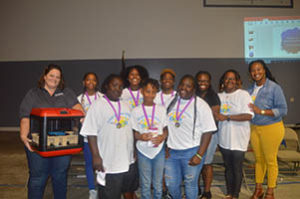Outreach educator leads after-school program to a national win

Amanda Hurst, the outreach educator for UGA’s Savannah River Ecology Laboratory, coached a team of students to win the American Farm Bureau Foundation for Agriculture’s spring Purple Plow Challenge: Protect the Pollinators.
The winners, Jasmine Coleman, Tamara Corley, Shawn Butler, Crystasia Williams, Zy’Kesia Johnson, Rayshawn James, Avery Trottie, Gabriel Hosey, Ivan Jamison and Namair Anderson, are middle-school students in the Dreams Imagination & Gift Development Program, a non-profit organization in Williston, South Carolina.
The students chose Team Marigold as their name after they distributed the flower in their community to educate residents about pollinators, including bees, butterflies and mosquitos.
According to the U.S. Fish and Wildlife Service, many pollinators are threatened or endangered due to habitat loss, degradation and fragmentation.
“The students decided to address what they could to improve the well-being of pollinators,” Hurst said. “They hypothesized that natural pesticides would act as a pest repellent, allowing the pollinators time to work.”
The team planted several tomato plants and created a natural pesticide from essential oils, garlic powder and water to protect them from insects and mold. A control plant was left untreated while another plant was treated with a chemical pesticide.
Hurst said the team quickly noticed the chemically treated plant grew much slower than the other plants.
According to Alix Ambriz, education specialist for the AFBFA, the team’s approach caught their attention.
“Team Marigold had an innovative approach to saving the pollinators by using natural pesticides,” said Ambriz. “In the agriculture industry, we are always looking for better ways to produce a safe and healthy food supply, and Team Marigold is doing their part in helping us on this mission.”
According to AFBFA’s website, the global decline of pollinator populations poses a threat to food production. The Purple Plow Challenge was developed to educate middle and high school students on the important role pollinators play in our daily lives and to develop ways to protect the population.
